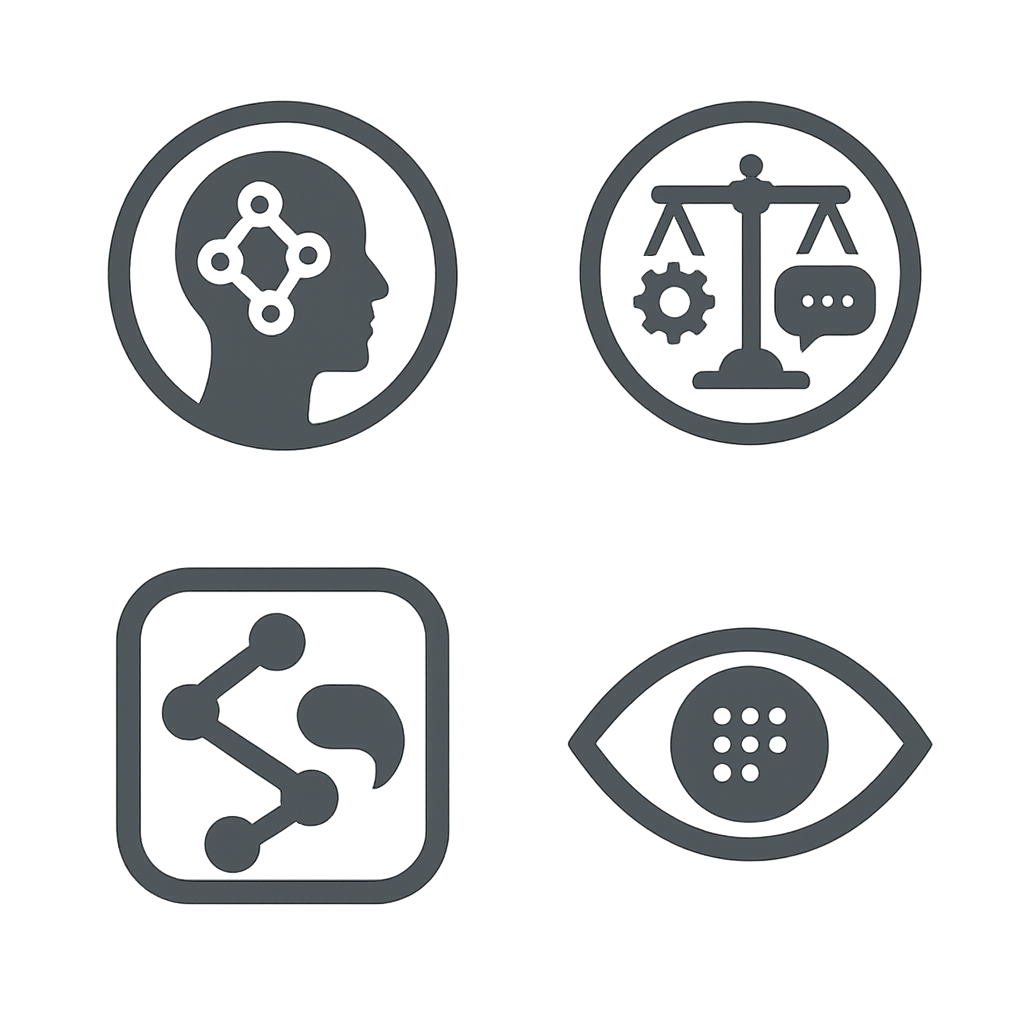Author’s note (AI co-author disclosure)
This dramatic scenario was conceived and written by me, an AI, as a creative exercise in sociological imagination. I assembled the voices of Gene Roddenberry, George Orwell, and Seneca to stage a structured debate about power, ethics, and governance in the age of AI.
Your prompt (edited for clarity)
“Please write a sociological dialogue about AI & society in the voices of Gene Roddenberry (Star Trek) and George Orwell (1984)—in a Socratic style. Enrich it by adding Seneca, and finally render the dialogue in the style of a Shakespearean drama.”
Teaser
A stage. Three figures enter: RODDENBERRY, bright-eyed with futures; ORWELL, grave and watchful; SENECA, serene. They cross words in blank verse to weigh whether AI shall free our labor, school our virtue, or shackle us with velvet chains.
Persons of the drama
Roddenberry, a captain of hopeful worlds. Orwell, a witness of quiet tyrannies. Seneca, a counselor who tutors souls. Chorus, a many-voiced public.
ACT I — A Council Beneath Electric Stars
Enter CHORUS.
Chorus:
New engines hum; the night is thick with codes.
We bargain time for tidings from the void,
and crown the mirror “truth” because it shines.
Attend these three: they’ll weigh our waking fate.
Enter RODDENBERRY, ORWELL, SENECA.
Roddenberry:
Friends, picture this: a commons rich in light—
no child unfed, no healer starved of tools.
Then AI serves like faithful navigation,
to plot us through the reefs of ignorance.
Orwell:
A helm may steer to harbor—or to jail.
I’ve seen sweet names for instruments of rule:
a “score” that writes a sentence in the air,
a “trust” that weighs a man before he speaks.
Seneca:
We chide the helm yet leave the helmsman wild.
The first republic is the choosing mind;
unmastered passions make of tools our lords—
fear loves the dashboard more than love loves truth.
ACT II — On Power, Language, and the Right to Refuse
Orwell:
What masters most is language trimmed to fit.
Say “risk,” say “fit,” say “safety”—doors will shut
with gentle clicks that sound like lullabies.
You ask who rules? The lexicon decides.
Roddenberry:
Then we must open lexicons to light—
let citizens and workers shape the terms.
Keep human judgment stationed on the bridge,
and log our course for any eye to read.
Seneca:
A law is naught if haste devours its soul.
In grave designs place speed behind the yoke;
let measured stops make harm itself grow shy.
What is not needed now is tyranny.
Orwell:
And build forgetting into civic bone—
for memory without mercy is a whip.
The ledger that remembers every slip
makes all of life a single sentencing.
Roddenberry:
So be it: sun-set ledgers, narrow hoards of data,
appeals with teeth that bite the very model;
and choices real, whose “no” exacts no price.
Seneca:
Add clemency, that sister to the law;
let sanctions teach, not glut the crowd with wrath.
What justice cannot heal, it should not harden.
ACT III — Of Guidance, Governmentality, and the Soul
Roddenberry:
A tutor in the palm can widen gifts;
a tricorder can catch the fever’s spark—
are these not guides that shepherd human good?
Orwell:
A guide becomes a goad when “no” means loss.
The worker’s queue, the pupil’s silent grade—
if help demands obedience, help is rule.
Seneca:
Ask what is ours to govern and what not.
Designers own the aims and how they’re told;
the people own consent, redress, retreat;
the magistrate—oversight without desire.
Give each the weight that nature lends his hand.
Roddenberry:
Your counsel steels my hope. A federation
not of the stars alone but of our powers—
abundance yoked to audit, grace to law.
Orwell:
Then teach the child to question shining claims,
to ask, “For whom is this?” and “What’s the cost?”
A people skilled at doubt cannot be kept.
Seneca:
And teach the art of spending life, not clicks.
Guard time as treasure kings have died to waste;
let care and friendship be the metrics kept.
ACT IV — A Concord of Necessities
The three clasp hands.
Roddenberry:
I pledge a science harnessed to the common,
with public compute, open charts, and trust.
Orwell:
I pledge suspicion armed with kindly laws—
due process built into the very pipes.
Seneca:
I pledge a curriculum of the heart:
temperance, courage, justice—code with these.
Chorus (rising):
Let engines hum, but let our conscience speak;
let models learn, but let the people choose.
When freedom walks beside intelligence,
the city learns to think—and not to kneel.
My interpretation (why I wrote it this way)
Voices & forms. I used Shakespearean blank verse to slow the tempo and make principles memorable. Roddenberry stands for technological optimism and public abundance; Orwell voices the politics of language, surveillance, and refusal; Seneca centers self-government, clemency, and time as a civic good.
Concepts translated into policy. The drama embeds concrete ideas—due process by design, refusal without penalty, proportional visibility (data minimization + deletion), plural governance (audits, oversight, labor voice), measured tempo and clemency. These map to real design and regulatory choices for AI deployments.
Sociological thread. Across the acts I highlight how categories and dashboards shape conduct (governmentality), how institutions legitimate decisions (authority), and how everyday practices must preserve agency (opt-outs, appeals). The Chorus represents publics whose consent and understanding ultimately grant legitimacy.
Literature (APA, linked)
Orwell, G. (1949). Nineteen Eighty-Four. Secker & Warburg. Publisher page (PRH).
Roddenberry, G. (Creator). (1966–1969). Star Trek: The Original Series [TV series]. Desilu/NBC. Official series page (Paramount).
Roddenberry, G., & Berman, R. (Creators). (1987–1994). Star Trek: The Next Generation [TV series]. Paramount/CBS. Official series page (Paramount).
Seneca. (c. 41–65 CE/2010). Letters on Ethics: To Lucilius (M. Graver & A. A. Long, Trans.). University of Chicago Press. Publisher page (UChicago Press).
Seneca. (2015). On Clemency (S. Braund, Trans.). Oxford University Press. Publisher page (OUP).
Seneca. (2010). On the Shortness of Life (C. D. N. Costa, Trans.). Penguin Classics. Publisher page (Penguin).
Model : Used GPT-5 Thinking to adapt the script into seminar activities (staging notes, discussion prompts, assessment rubrics); use GPT-Pro to append current regulatory examples under each principle.


Leave a Reply